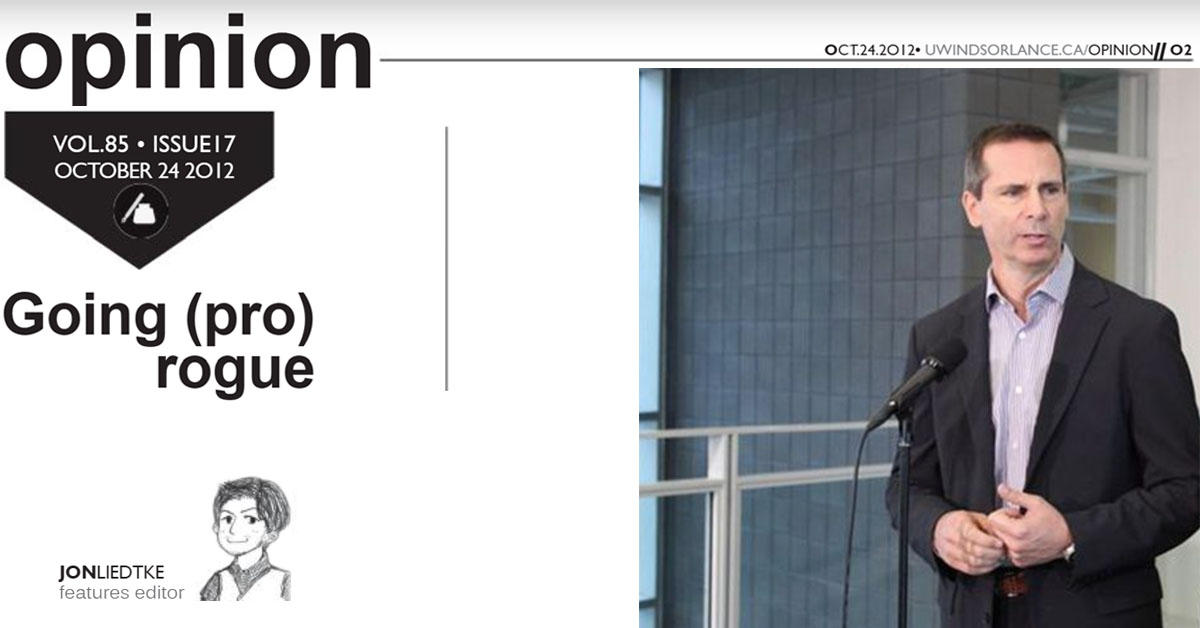UWindsor Lance
Issue 17, Volume 85
Oct. 24, 2012
Jon Liedtke
What a week for provincial politics.
Out of left field, Premier Dalton McGuinty prorogued (dismissed) parliament after stating that he intended to both resign as leader of the Ontario Liberal Party and step down as MPP for Ottawa-South.
McGuinty said he asked his party’s president to call a leadership convention a.s.a.p. and following the election of a new leader, there would be a provincial election to
usher in a new government.
Well that’s the end of that chapter.
Just when the furor over Prime Minister Stephen Harper’s double prorogation had died down, McGuinty decided to employ the very same tactic to maintain control of a political situation before it devolved into scandal.
And don’t let anybody convince you otherwise; maintaining control of a scandal is the sole reason that McGuinty decided to exit stage left.
Deciding to scrap two gas plants in Oakville, Ont, and Mississauga, Ont. to save two Liberal seats may very well end up costing Ontarians anywhere between $200million to over $1 billion; nobody is entirely sure just how much scrapping the plants cost.
What we do know, however, is that McGuinty had planned to suspend the legislature this week before he decided to resign. He was truly attempting to minimize fallout.
The Toronto Star reported that McGuinty intended to prorogue in order to negotiate a wage-freeze deal with 481,000 unionized public servants. Canadians were offended when Harper dismissed Parliament amid his own scandals and controversies, and Ontarians should be offended that McGuinty would decide to do the same.
Why should you be offended? Well the answer is quite simple.
The act of proroguing parliament is a legitimate political tool that parliamentarians have at their behest. At the end of the legislative session, the leader of the party
in power requests of the Governor General to prorogue parliament, and effectively send home all of the parliamentarians until the next legislative session.
That’s how it’s supposed to work.
Unfortunately, politicians are well aware that prorogation can be an effective tool to push scandals and controversy out of the public consciousness. As cynical as it is, during a scandal, citizens are mobilized and upset. Afterwards, they are typically placid and apathetic. As such, both McGuinty and Harper, and indeed, many before the two of them, have decided that the working of government is just too difficult. Indeed, democracy can be a real bummer when you need to ram through legislation without negotiation or compromise.
In due time, the public will come to learn the intricate particulars of the gas plant scandal. Labour leaders are already publicly stating they do not intend to work with McGuinty so long as the government has been dismissed.
All we can hope now is that the general public, who we already know to be vastly apathetic and disconnected from the political process, do not delve deeper into the
abyss that is passive participation.
The province and the country at large demands and deserves an informed, engaged and active electorate. While the current state of affairs is disheartening, there is always hope to make it better. Will it take time? Absolutely, just as it took years of progressing apathy to reach this point, it will take years to undo the damage.
Issue 17, Volume 85
Oct. 24, 2012
Jon Liedtke
Page 2
Jon Liedtke was the Features and Opinions Editor, Advertising Manager and Deficit Consultant at the UWindsor Lance.




Leave a Reply